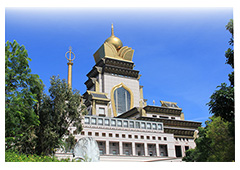Chung Tai Tradition
 The Buddha Dharma is vast and profound. For all disciples to be effective and well-rounded in their spiritual practice, the Grand Master organizes training at Chung Tai to adhere to the following three frameworks: “Three Links of Cultivation,” “The Four Tenets of Chung Tai,” and “The Five Approaches of Propagating Buddhism.”
The Buddha Dharma is vast and profound. For all disciples to be effective and well-rounded in their spiritual practice, the Grand Master organizes training at Chung Tai to adhere to the following three frameworks: “Three Links of Cultivation,” “The Four Tenets of Chung Tai,” and “The Five Approaches of Propagating Buddhism.”
Three Links of Cultivation: A Principle for Complete Spiritual Practice
Integration of three disciplines (scriptural studies, deeds of beneficence, meditation) is Chung Tai’s guiding principle for a well-rounded Buddhist practice, each being an inseparable link that complements and reinforces the other two. Scriptural studies establish right views and insight. Deeds of beneficence involve performing good deeds and services to the monastery and to the public; for example, the Grand Master has led the Sangha and lay disciples in relief efforts for such natural disasters as the 2004 tsunami by conducting blessing dedication and memorial services for the victims. Meditation calms, clears and awakens the mind. Integration of these three disciplines ensures proper progress on the path to Buddhahood.
The Four Tenets of Chung Tai: Concrete Guidelines for a righteous way of living
The Chan (Zen) teachings, although profound, are intimately connected to daily living. The Four Tenets of Chung Tai are concrete guidelines for practicing mindfulness in daily life:
To our elders be respectful: Respect subdues arrogance.
To our juniors be kind: Kindness dispels anger.
With all humanity be harmonious: Harmony overcomes rudeness and violence.
In all endeavors be true: Truthfulness eradicates deceit.
The Five Modern Approaches of Propagating Buddhism
It is crucial to preserve the essence of the Buddhist teachings while adapting them to changing environments and modern societies. The Grand Master emphasizes the importance of making connections in the following areas: Buddhism in Academic Research, Buddhism in Education, Buddhism in Culture and the Arts, Buddhism in Science, and Buddhism in Daily Living. These five approaches accommodate the needs and interests of different people and cultures, opening many doors for the discovery of the benefits of Buddhism and the attainment of true liberation.

